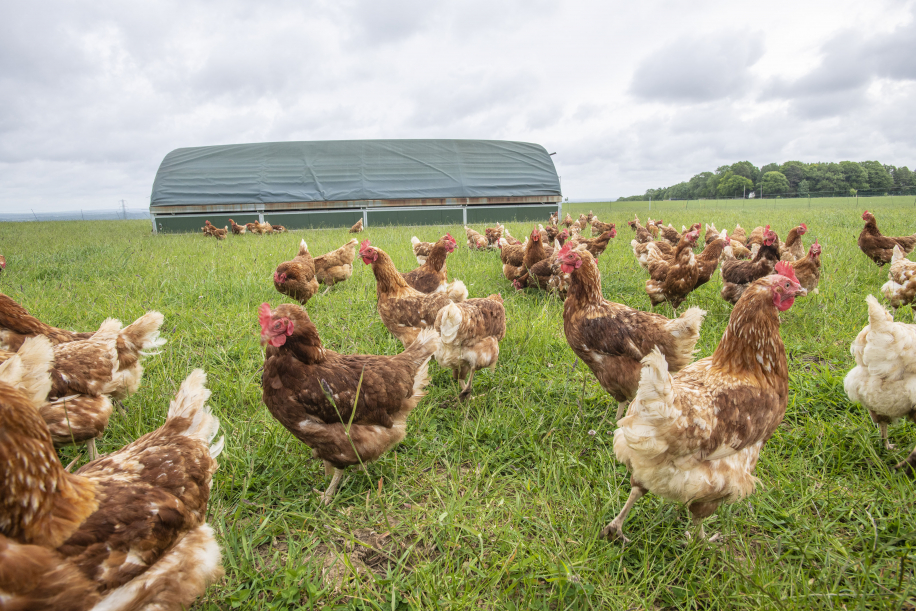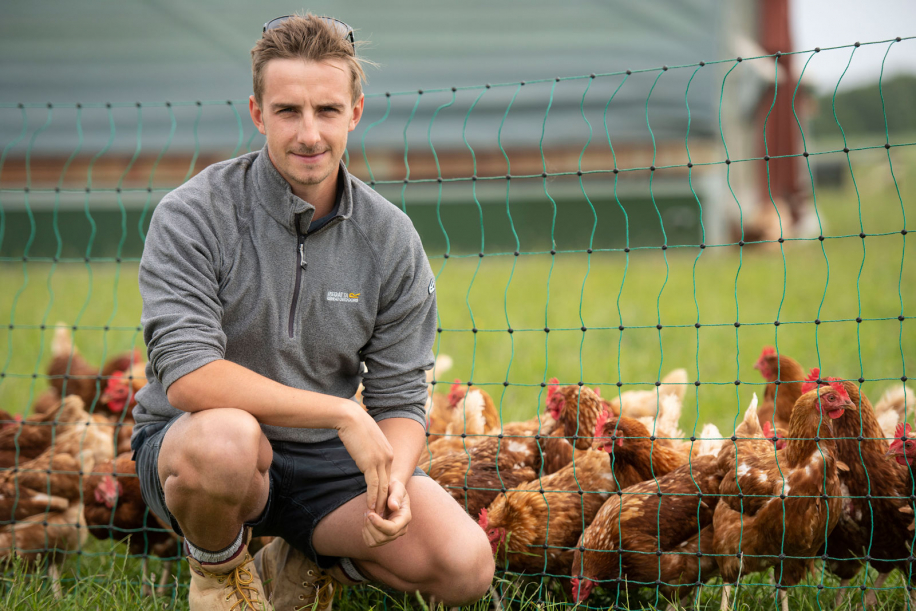Chickens, Eggs (& Cattle too)
Aim: Take advantage of the increase in insect protein created by rotationally grazing livestock across the estate.
Detail: As the grazing livestock move through their grazing platform there is a concentration of manure at a uniform age in a defined place on the farm. This manure attracts a wide range of bugs and insects that use it as a source of food and incubation for the next generation.
How: This protein will be captured by moving a flock of chickens behind a grazing livestock enterprise.
Why it’s good for the circular system: This is a perfect place to have chickens brought into the system. To access the bugs the chickens must get into the cow dung and this naturally causes the spreading, and even distribution of the manure across the field, exposing the manure to sunlight and killing any internal cattle parasites.
Why it’s a win-win enterprise: By allowing chickens to exhibit their natural behaviour of scavenging fresh ground with their beaks, they should be healthier, and produce better quality eggs with a great marketing story. They should require a lower (and cheaper) bought in protein diet, and in the future it’s hoped that much of that diet can be home produced. This system should be able to take advantage of the need to clean organic crops before sending them off to market, by utilising the cleanings as a food source.
It’s also recognised that eggs should form a vital part of our offer of estate-produced food to the general public. This is because eggs are required at weekly intervals, providing regular visits from customers.
Reality check: This process will not provide enough food for the poultry and it is inevitable that extra food will need to be bought in. This extra food will be additional nutrients brought into the farming system, helping the whole system thrive.

CIRCULAR ECONOMY IN ACTION
ROLLING EGGS
Introducing… Ben Reynaldo.
Ben has taken on this opportunity, with a wish to run his own farming enterprise on the estate. After initial research into the farming operations that might suit the situation, he settled on laying chickens.
Trials into how this mobile egg laying poultry unit might work have been going on for a number of years, initially starting with 25 chickens and gradually building up from there as experience and confidence in both the system and the market grew.
Ben is now ready to take this to a next level to start to make the system a scalable and commercial enterprise.
Initially there will be 2 chicken sheds holding 300 birds each involved in the system; these will follow as closely behind the dairy unit as possible.
It’s recognised that there will be times when it is not possible or sensible to do so. In the early stages of this project Ben, has found out what works and doesn’t work with this system, and is now well placed to utilise this experience to make this a success.
Shared farming in action
As this is the first time Ben has run his own enterprise, he will need a degree of mentorship, especially in business management.
This will be provided by Tim May and the team at Kingsclere Estates, providing advice and support where needed.
The capital requirements for this enterprise are such that it can be provided from working capital from both parties, reducing the need to seek external borrowing.
Kingsclere Estates are purchasing the sheds and will have them converted for mobile use with the hook lift trailer system. We’re also purchasing a vending machine and building a shed for selling the eggs.
Ben will buy anything else that he needs.
These elements will be easy to sell in the future if needed, as they’ll be transportable and standard road width – as opposed the sheds, which will be too wide to move without destroying them.
The two parties will equally pay for the running costs of the enterprise and share out the income, according to what they’ve put in.
